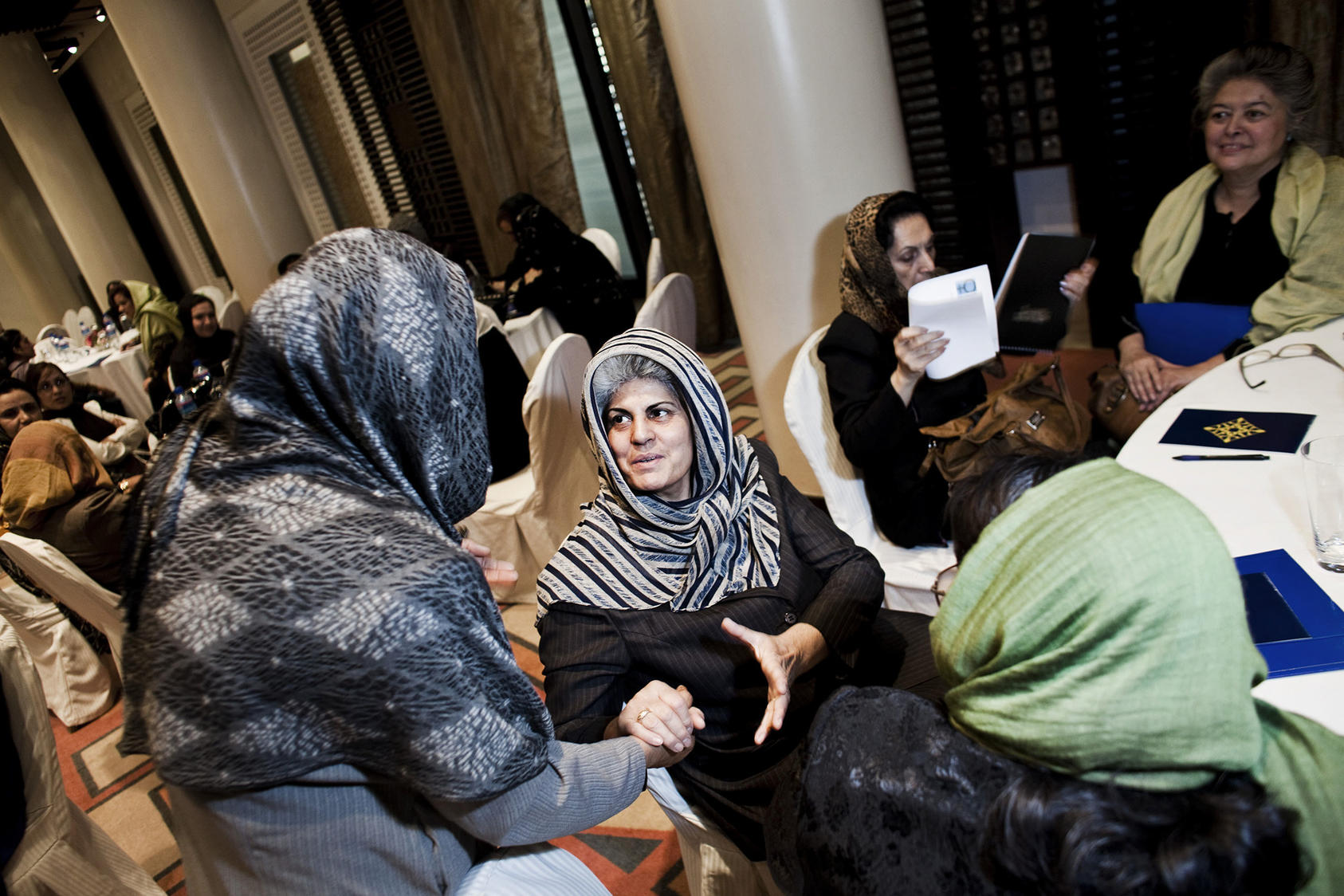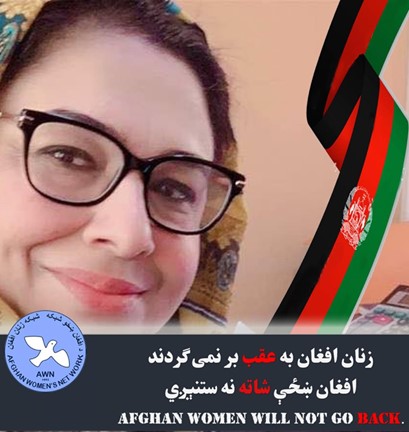How can we negotiate with the Taliban? Afghan women know.
Palwasha Hassan is learning how grassroots women achieve dialogues with Taliban fighters.
Afghan political leaders met in Moscow this week with Taliban representatives amid new momentum in diplomatic efforts to end Afghanistan’s war. Like other recent discussions, including those between U.S. envoy Zalmay Khalilzad and Taliban representatives in Qatar, Afghan women remain almost entirely excluded. Yet mostly unnoticed amid the formal diplomacy, Afghan women at their country’s grass roots already have managed negotiations with local Taliban leaders.

Diplomats and policymakers should be mining the experiences and insights of these women. “The legitimacy and sustainability of peace depends on the full, equal and meaningful participation of women,” warned the Afghan Women’s Network, the country’s most prominent women’s civic group, in a statement this week. The Taliban movement famously and brutally dismissed rights for women during its rule over Afghanistan from 1996 to 2001, citing its repressive interpretation of Islamic law. Thus, many outside observers question whether Taliban can now be brought into a peace process that includes women.
Talking to Taliban: Women’s Successes
While that will not be easy, Afghan women leaders insist that it is possible, and indeed has been achieved at local levels. One such leader is Palwasha Hassan, a lifelong women’s rights activist who serves on the government’s High Peace Council—a body that for years has pursued peace efforts with the Taliban.
“The international community is failing to value what we have achieved together and the progress we have made so far. In the end they are letting it all go,” she said in an interview. “They have to include women, both to protect our rights and also to ensure the durability of the peace that follows.” Hassan is a former Jennings Randolph Fellow at USIP.
In the two decades since the Taliban ruled Afghanistan, some of the movement’s leaders have voiced recognition of limited rights to education for girls, and to jobs for women in a few sectors, if they are segregated from males. But one of the toughest knots in the effort to bring peace to Afghanistan remains the Taliban’s rejection of women’s rights—to education, to careers and to public roles in the governance of society. Hassan has shown progress in opening dialogue between Taliban and women, largely by mining a series of small-scale successes by women in Afghanistan’s provinces. In dozens of cases, they have persuaded Taliban in their communities to negotiate—and sometimes have won compromises.
“Women need to know their own rights in Islam and need to know how to articulate them to protect their rights in a way that the Taliban and the most conservative corners of the community can understand,” Hassan said in an interview. That effort—presenting the case for women’s rights to the Taliban in a framework of Islamic values that Taliban members recognize—is one she has pursued for years.
Palwasha Hassan’s Story
Among the many Afghan women who have taken leading roles in Afghan government or civil society, Hassan is one of a handful who focus on this problem of translating women’s rights into language that can engage the Taliban. Another is Ayesha Aziz, a businesswoman and women’s activist who has served as a top negotiator for Afghanistan’s Hezb-i-Islami movement.
Hassan grew up in Kabul, the daughter of a prominent Pashtun tribal leader. She recalled as a child telling her father or uncles about injustices she saw around her, only to have them ask her what effort she had made to rectify them. She said this led her as a schoolgirl to speak against teachers’ corporal punishment of her classmates—and as a college student to organize volunteers to help street children and people injured in bombings in Kabul.
In the mid-1980s, Hassan and her family had fled the country’s warfare and were among the millions of Afghans living as refugees in Pakistan. When Hassan’s sisters helped establish the Afghan Women’s Educational Center to run schools for refugee children, Hassan joined in. In subsequent years, she helped start several voluntary, civil society groups, including an Afghan cultural center, a women’s shelter and the Afghan Women’s Network, an association to promote women’s rights.
Hassan has worked to bridge Afghanistan’s communal divisions. By 1996, the Taliban were conducting brutal attacks against Afghanistan’s ethnic Hazara minority, who are Shia Muslims and thus condemned by the Taliban’s interpretation of Sunni Islam. Among the Afghan refugees in Pakistan, Hazaras felt threatened by Pashtuns. Hassan empathized and invited the Hazara community to use schools and offices that she oversaw to hold their religious meetings. From that, she built a series of discussions and dialogues between Shia and Sunni groups to learn about each other’s religious beliefs and break down their mutual fear and intolerance. At the schools she helped run, Hassan worked to have intolerant language removed from curricula and peace education taught in the classrooms.
With the overthrow of the Taliban in 2001, Hassan was invited to the Bonn conference that established an interim Afghan government—but she abstained on principle, saying that all Afghan groups had not been included and that violence was still continuing. But two years later she took part in meetings to help draft a new Afghan constitution. She recalls hearing an ethnic Uzbek woman describing Uzbeks’ stereotype of Pashtuns as wild and barbaric—exactly the language that Hassan had heard Pashtuns use about Uzbeks. “I realized that we didn’t really know each other,” she recalled—and she again organized dialogues among women to break down those barriers.
Translating to the Taliban
Hassan says she sought training in in Islamic thought to better articulate the arguments for women’s rights through Islamic values. She consulted Musawah, an international, women-led organization based in Malaysia that promotes equality in family relations in the Muslim world, and Karamah, a U.S.-based association of Muslim women lawyers that promotes human rights. These organizations are valuable in speaking of women’s rights through modern and feminist interpretations of Islam, she explained. They helped her better understand Sharia (Islamic jurisprudence) and the process of Quranic interpretation. But this approach was not so helpful in articulating and defending women’s rights in the language of the Taliban and their conservative Islamic value system.
Yet from Hassan’s broad contacts among women of Afghanistan’s disparate communities, she learned that women in various localities had managed small-scale successes in negotiating with local Taliban groups. In 2010, she held a workshop with women leaders from towns and villages across Afghanistan to document their experiences—an event to which she invited me. There, stories emerged of local women negotiating successfully with the Taliban and similarly conservative leaders.
- A woman from Paktia province told of negotiating to keep a local girls’ school open by arguing that educated girls could do better in Islamic studies, including learning to read the Quran. She also guaranteed to her Taliban interlocutors that a prayer space within the school would be reserved strictly for women and girls only.
- A woman from Baghlan province explained how she and others negotiated the release of hostages being held by the local Taliban commander. She appealed to Islamic values of life and justice, and persuaded the captors that the hostage was being held unjustly.
- A woman who was a respected Quran teacher in Kandahar province recounted negotiating, with Taliban approval, a halt to a blood feud.
Here was the key. These women knew how to articulate shared Islamic values around the topic being negotiated in ways that appealed to the Taliban and other conservative leaders in their community. These are the women we need to learn from—yet their bases in the provinces, many of them rural, makes it harder to integrate the lessons of their experience into women’s rights work that often is shaped by urban-based groups, women with more formal and secular educations, and international support.
Next Step: Add Women’s Voices in Diplomacy
With help from Hassan and other women leaders, the U.S. Institute of Peace is working to document the cases of women who negotiate peace on the ground in Afghanistan and in conflicts around the world. USIP is convening such women and collating their experiences to develop country-specific guidelines and curricula to help women negotiate, and better protect their rights, with violent movements driven by particular religious value systems. A 2017 law, the Women, Peace and Security Act, requires the U.S. government to promote the roles of women in peace processes, which have been shown to be more effective when women are included.
“These women have better solutions (for peace) that are more holistic—we need to listen to them and not just accept that only the men know what to do for peace,” Hassan said.
Hassan is now the executive director of the Afghan Women’s Education Center, founded years ago by her sisters. She is using that group to hold a series of conferences across several Afghan provinces to seek local women’s experiences and suggestions for negotiating with the Taliban.
As U.S., Afghan, and international diplomats and policymakers draw the Taliban into peace negotiations, they should monitor the insights gathered by Hassan and her colleagues from the ground-level successes of Afghan women who have persuaded local Taliban clerics and commanders to listen to them. Those insights, like the voices of women who achieved them, should be fed directly and firmly, into all diplomatic efforts to end Afghanistan’s bloodshed.




